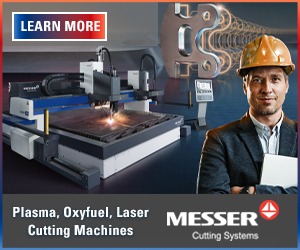THREE FOR ONE
By examining how Mississippi Gulf Coast Community College created a sustainable training program, a three-prong strategy emerges for welding education and job placement as well.
Posted: October 13, 2010
PART 3: PROGRAM SUSTAINABILITY
As with all grants, a key component is sustainability. This WIRED program is expected to continue in the same “standard of excellence” after the grant period. Fortunately, the college already has an excellent program in place from which to build upon. “We have a Pre-employment Workforce Development Program that is sponsored by a consortium of local industries and is funded by the Mississippi State Board for Community and Junior Colleges,” says Landry. “It’s an open-entry, open-exit type of program. Many of the best practices developed in WIRED will continue in the pre-employment program. Students will continue to be awarded certificates of completion which adhere to AWS standards, making sustainability possible for us.” Currently, between the pre-employment program and the WIRED program, the college trains 70 students per day at just one campus site.
BONUS: TAKING IT MOBILE
Coincidentally, about the same time that the WIRED project began, the State Board for Community and Junior Colleges made funds available for special workforce projects. The college, recognizing the need for flexibility, used the funding for a mobile welding trailer/classroom. The trailer moves between campuses and employers as needed. “If the employer calls, all we need is a tractor ready to move the mobile unit and an electrician to reconnect when it gets there,” says Landry. “For example, we delivered the trailer for a project at Trinity Yachts, and their electrical staff had it up and running in a matter of hours. I don’t know where you could build a classroom with exhaust systems and everything needed in weeks, much less hours.”
“Initially we were so short-staffed that we were only doing fillet tests,” agrees Leleux. “Then the facility decided that everyone should be trained across the board in fillet and butt welds. They brought in the mobile trailer and an instructor, and our entire facility went from 37 to 100 percent trained in four months.” As with the equipment in classrooms, the equipment on the trailer meets the college’s standard of excellence. Eight XMT® 350 multi-process inverters and two Dynasty® 350 AC/DC TIG inverters fill the trailer’s ten welding booths. Porter chose the XMTs for their outstanding arc performance and multi-process capabilities, and their size allows for more training to occur at one time inside the trailer.
Porter says, “If a company needs to run aluminum spray arc at a site, we add push-pull wire feed systems on the XMT 350s and are able to train on that process. We also have a standard feeder on the XMT 350s that allows us to run flux cored wire as well. We can also Stick weld with them and can even do DC TIG. The size of XMTs and Dynastys allowed us to put more weld stations in and thus have more room inside the unit.” The Dynasty also simplifies the AC TIG training process. “It has the most stable arc that I’ve ever welded with on a TIG machine,” says Porter. “Because of its outstanding performance, it makes training a person easy.”
With one instructor, eight trainees on XMT multi-process machines and two on the Dynasty 350s, a lot gets done in a short period of time. Mission accomplished!
PARTNERSHIP? PRICELESS!
Employers in the area understand what it means to participate in a full partnership. There’s a mutual appreciation, respect and generosity between the college and its industry partners that exists in each component of MGCCC’s successful welding program: flexible training, workforce collaboration and sustainability.
Trinity Yachts typifies only one of the school’s partners. “They don’t just come to us and ask us to help them out,” says Landry. “They support us with materials and curriculum development. They assisted in developing standards for the WIRED program and provided input and company information. That relationship exemplifies an open door policy. Trinity is a true partner.”
“They go hand-in-hand,” adds Leleux. “It’s priceless, just priceless.” In other words, the program is only as good as the partnerships created and nurtured, as well as the quality of training it provides. Without collaboration on each level, students don’t secure as many jobs, period.
Miller Electric Manufacturing Co., 1635 W. Spencer Street, Appleton, WI 54914-5022, 920-734-9821, www.millerwelds.com.













